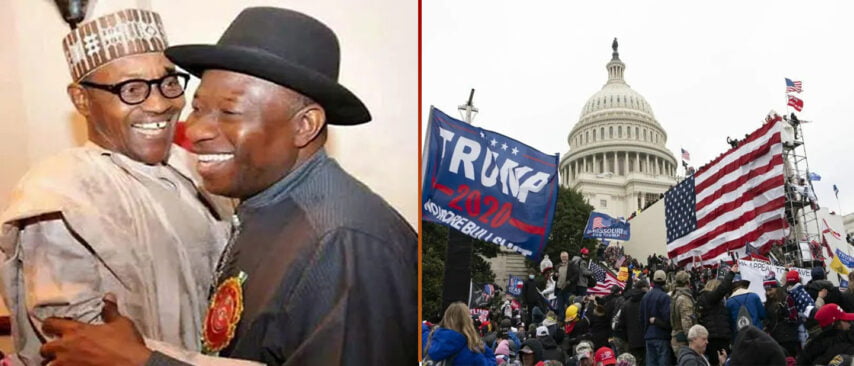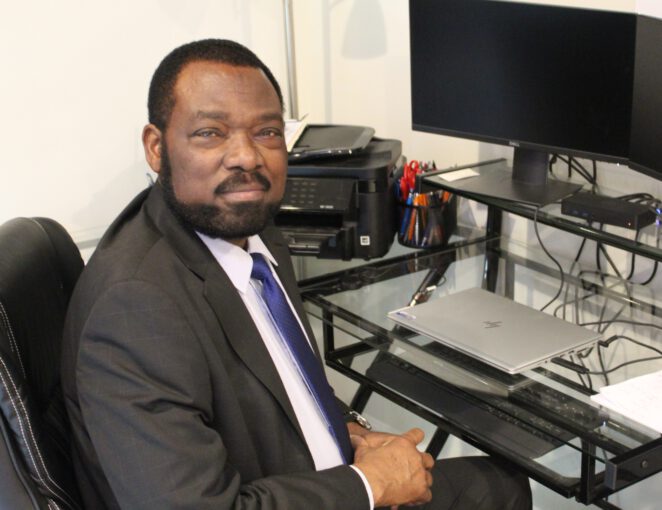Nigerians, give America a lesson in democracy…again

BY SOUMANOU SALIFOU
Founder/Publisher/Editor, “The African Magazine”
Two of the fundamental criteria of democracy are the people’s ability to freely choose their leaders, and the acceptance of an election result—the will of the majority—by all. One needs no binoculars to see that democracy has been in steady decline for over a decade in Sub-Saharan Africa after the advances of the 1990s. Sons are still succeeding their fathers as heads of state at the cost of hundreds of lives of protesters; Cameroon’s president Paul Biya recently celebrated his 40 years in power to the displeasure of members of the Cameroonian diaspora in Paris who disrupted a lavish dinner organized by Biya to celebrate the occasion in France. It’s public knowledge that a few months ago, President Patrice Talon of Benin, addressing an audience of business leaders in Paris, bragged about the wounds he has inflicted on the democracy of his country once hailed as a beacon of democracy.
Despite the imperfections of its democracy, Nigeria has been one of the rare exceptions on the continent.
Barring the big loss of lives during the 2007 Nigerian presidential election that European observers described as “the worst they had ever seen anywhere in the world,” with “rampant vote rigging, violence, theft of ballot boxes and intimidation,” Nigeria’s journey toward democracy since it ended sixteen years of military rule in 1999 with the election of Gen. (retired) Olusegun Obasanjo as president has been quite smooth. Probably the most visible sign of this was the warm embrace (in the above picture) between President-elect Muhammadu Buhari and outgoing President Goodwill Jonathan after the latter lost the violence-free 2015 election despite massively outspending his opponent.
Lately, the same cannot be said about the largest democracy in the world, the United States which, after the election of 44 presidents—most of whom have upheld the constitution—saw its democracy descend into an abyss of lawlessness following the election in 2016 of Donald Trump, a heavily indebted entrepreneur who ran for president in quest of publicity and won, to everyone’s surprise and his own. A sore loser, the twice impeached 45th U.S. president attempted a bloody coup to prevent the confirmation of his duly elected opponent. Despite sixty rulings by the courts that confirmed his loss, Trump continued to falsely claim that he has won the election, going as far as asking recently for the termination of the constitution to reinstate him in power.
Adding insult to injury, as a confirmation of the decline of U.S. democracy, a fraction of the leadership of the former president’s party agrees with his lies. A few of them openly supported the coup attempt.
While at first a few Republican leaders openly condemned the bloody attack on their country’s sanctuary of democracy, only two of them have not relented in their criticism. Others who also rejected the coup attempt and Trump’s lies in private don’t have the gut to cross the former president openly, knowing Trump’s ability to end their political career as he has done to several of their colleagues. They are also mindful of the sad reality that about 30-35 percent of their party’s base blindly supports Trump who has brought out in the open the dark forces that most Americans didn’t believe still existed.
Trump’s impact on a few members of his party’s leadership strongly influenced the painful election of the (Republican) speaker of the House of Representatives this weekend to the point where two lawmakers of the party came almost to a fist fight prevented by one of their colleagues.

Indeed, as shown in the above picture, after the failure of 14 attempts throughout the week to elect the new speaker last Friday night–something the country has not seen in more than a century–U.S. Representative Richard Hudson, a Republican member from North Carolina, pulled back his Republican colleague Mike Rogers from Alabama to avoid a possible fist fight with Republican Representative from Florida, Matt Gaetz, whose strong opposition delayed the election of Republican Representative Kevin McCarthy from California as Speaker of the House of Representatives.
Thanks to the resiliency of its institutions strengthened by more than two centuries of democratic rule, the United States has survived the attacks on its democracy started by one broke entrepreneur and carried on by his followers in Congress, earning from some of their colleagues the ill-fame characterization of “terrorist.”
Nigeria’s institutions, by contrast, are very young and vulnerable like all those across the developing world. The young nation, therefore, cannot survive attacks similar to those perpetrated by Trump and sustained by his allies. Nigeria must continue its journey toward democracy.
It’s obvious that Nigeria’s democracy has room for improvement, but the world’s largest black nation has earned the right to give a lesson in democracy to the world’s most powerful nation and make us all proud of where we came from.


